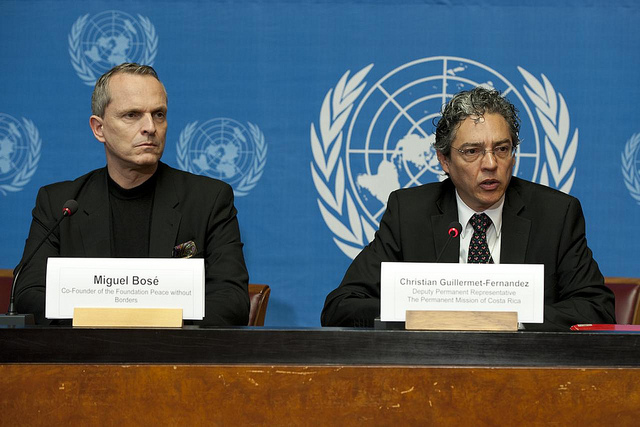
Credit: UN Geneva / Violaine Martin
On January 30, 2015, the United Nations Human Rights Council Open-ended Intergovernmental Working Group on the Draft United Nations Declaration on the Right to Peace held informal consultations with non-governmental organizations and Member States in preparation for the third session of the Working Group, which is scheduled for April 20 to 24, 2015. [Human Rights Centre of the University of Padua] The Working Group is tasked with developing a non-binding statement reflecting the international community’s consensus regarding the right to peace and outlining States’ obligations with regard to this right.
The Working Group is composed of UN Member States’ representatives, but all UN Member and Observer States, intergovernmental organizations, non-governmental organizations with consultative status, and other stakeholders may attend the Working Group’s public meetings. Information about obtaining accreditation for the upcoming third session is available online.
The Creation of the Working Group
In 2008, Human Rights Council reaffirmed that all humanity enjoys “a sacred right to peace” and that the “preservation of the right of peoples to peace and the promotion of its implementation constitute a fundamental obligation of each State.” Human Rights Council, Resolution 8/9, Promotion of the right of peoples to peace, UN Doc. A/HRC/RES/8/9, 18 June 2008, paras. 1and 2. At the same time, the Human Rights Council called for an expert workshop to “clarify the content and scope of this right”; suggest measures to “raise awareness of the importance of realizing this right”; and propose concrete steps to “mobilize States, intergovernmental and non-governmental organizations in the promotion of the right of peoples to peace.” Id. at para. 10.
Following the expert workshop, the Human Rights Council called on its Advisory Committee, together with Member States, civil society organizations, academics, and all other stakeholders to draft a declaration on the right to peace. Human Rights Council, Resolution 14/3, Promotion of the right of peoples to peace, UN Doc. A/HRC/RES/1/3, 17 June 2010, para. 15. The Advisory Committee submitted its draft declaration on the right to peace in its report to the Council at its 20th session. Human Rights Council, Report of the Human Rights Council Advisory Committee on the right of peoples to peace, UN Doc. A/HRC/20/31, 16 April 2012, Annex.
After receiving the Advisory Committee’s report, the Human Rights Council established the Working Group on the Draft United Nations Declaration on the right to peace by Resolution 20/15 in July 2012, with a mandate to negotiate a draft UN resolution on the right to peace. See Human Rights Council, Resolution 20/15, Promotion of the right to peace, UN Doc. A/HRC/RES/2015, 5 July 2012, para. 1.
Progress of the Working Group
The Working Group has conducted two sessions to date, the first in February 2013 and the second in July 2014. The Working Group’s second session report indicated that the fundamental issue to achieving a declaration on the right to peace is establishing whether or not such a right exists in international law. At the second session, numerous delegations asserted that, “the right to peace [is] a fundamental precondition for economic and social progress and the enjoyment of all human rights,” and that this right already exists as a “collective right” in international law. Report of the open-ended intergovernmental working group on a draft United Nations declaration on the right to peace, UN Doc. A/HRC/C/27/63, 8 August 2014, para. 21. In contrast, other States disagreed that peace is a prerequisite to human rights, asserted that no right to peace exists in international law, and questioned the need for a declaration on the right to peace. Id. at para. 22.
Reflecting this fundamental disagreement, the draft declaration presented by the Working Group after its second session nowhere states that there is a “right to peace” as such. Instead, it asserts that all are entitled “to the promotion, protection and respect of all human rights and fundamental freedoms, in particular the right to life, in a context in which all human rights, peace and development are fully implemented.” See id., Annex II, draft Art. I.
Submissions to the Informal Consultations
In the context of the recent informal consultations, the Human Rights Centre of the University of Padua and the UNESCO Chair of Human Rights, Democracy and Peace of the University of Padua requested that the Working Group replace the current text of draft Article I with language that explicitly recognizes the human right to peace. See University Human Rights Centre and UNESCO Chair, Human Rights, Democracy and Peace, Motion: We have a right to peace, Submission to the Informal Consultations of the Open-Ended Intergovernmental Working Group of the Right to Peace, 10 December 2014. A joint submission by several civil society organizations likewise requested that the Working Group expressly “[a]ffirm the human right to peace as an autonomous right, deeply rooted in international human rights law.” Joint Statement CSO, Submission for Informal Consultations with the Chairman-Rapporteur of the Intergovernmental Working Group on the Right to Peace.
The Working Group will meet in April of this year for its third session, to continue its work.
To learn more about the work of the United Nations to protect and promote human rights, visit IJRC’s Online Resource Hub.
